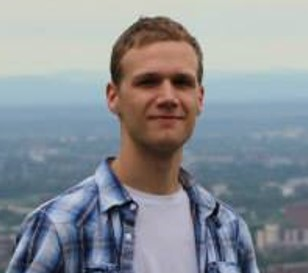Trace: » gohsc » alumni » tsikourasa
This is an old revision of the document!

Anthony Tsikouras
Postdoctoral Researcher in Engineering Physics
Ph.D. in Engineering Physics, McMaster University
Bachelors in Engineering Physics (Photonics), McMaster University
Email: tsikoua@mcmaster.ca
Office/Lab: ETB/306
Phone: (905) 902-3897
Research
Compared to widefield imaging, confocal microscopy is able to detect finer details in thick samples by blocking the contributions from out-of-focus fluorophores, therefore allowing for optical sectioning. Performing a traditional laser-scanning confocal scan requires either a long integration time, or high excitation light fluence that can be damaging to biological samples. In order to acquire a confocal scan that is both fast and gentle, the process must be multiplexed, with the sample being interrogated by a large array of excitation foci with low individual optical power. The most common implementation of multi-point confocal uses a pair of spinning disks patterned with microlenses and pinholes, respectively, where a fraction of a turn of the spinning disk unit is enough to sweep the foci across the entire sample. At present, spinning disk confocal is by far the most commonly used implementation of confocal microscopy for high-throughput imaging applications, due to its high acquisition speed and gentle light levels without significant sacrifices to image quality.
The spinning method for scanning, however, does not allow for the returning emission light to be “descanned” to a discrete detector - as a traditional mirror galvo scanner would. Instead, the emission light is scanned across an imaging detector in order to produce the reconstruction. This limits its choice of detectors to those that can be implemented into a dense imaging array, making it unsuitable for a number of imaging modalities, such as TCSPC-based FLIM, hyperspectral, or high quality intensity imaging via photon counting. Our design instead employs scanning windows that are capable of quickly scanning a large array of foci while maintaining a descanning path to discrete detectors. We are exploring a number of candidate detector options, including SPAD arrays, gated imagers, and those with specially-designed CMOS architectures. Our goal is to develop a multi-point confocal scanner that can compete with today's spinning disk confocal imagers in terms of frame rate and field-of-view, while outperforming them in image quality, imaging modality, and cost.
Publications
Tsikouras, A., Peronio, P., Rech, I., Hirmiz, N., Deen, M.J., Fang, Q. (2016) Characterization of SPAD array for multifocal high-content screening applications, MDPI Photonics, 3, 56.
Tsikouras, A., Berman, R., Andrews, D.W., Fang, Q. (2015) High-speed multifocal array scanning using refractive window tilting, Biomedical Optics Express. 6: 3737-3747
Tsikouras, A., Ning, J., Ng. S., Sinclair, P., Berman, R., Andrews, D.W., Fang, Q. (2012) Streak camera crosstalk reduction using a multiple delay optical fiber bundle. Optics Letters. 37: 250-252.
Conference Presentations
Tsikouras, A. (2014), “Designing a scanning system for multiplexed confocal FLIM microscopy using refractive window tilting,” Society of Biomolecular Imaging and Informatics 1.
Tsikouras, A., Yeh, S.C., Fang, Q. (2014), “Instrumentation design for high-speed FLIM for applications in high-content screening,” Electrochemical Society Meeting 225, 1487.
Tsikouras, A., Ning, J., Ng. S., Sinclair, P., Berman, R., Andrews, D.W., Fang, Q. (2012), High-throughput FLIM-FRET nanoimaging for quantification of protein-protein interactions in high-content screening [oral presentation]. SPIE Optics + Photonics (conference). 8460-04.
Schedule
| Monday | Tuesday | Wednesday | Thursday | Friday | |
|---|---|---|---|---|---|
| 8:30am | |||||
| 9:30am | |||||
| 10:30am | |||||
| 11:30am | |||||
| 12:30pm | |||||
| 1:30pm | Lab Meeting | ||||
| 2:30pm | |||||
| 3:30pm | |||||
| 4:30pm | |||||
| 5:30pm |
Courses taken:
| Course | Description | Semester |
|---|---|---|
| BME 701 | Biomedical Engineering Core I | 2010/2011 Term 1 |
| BME 706 | Biomedical Engineering Core II | 2010/2011 Term 2 |
| ECE 762 | Detection and Estimation Theory | 2011/2012 Term 1 |
| CSE 701 | Foundations of Modern Scientific Programming | 2013/2014 Term 1 |
| CE 6TN4 | Image Processing | 2013/2014 Term 2 |
| BME 707 | Advanced Topics in Biophotonics | 2014/2015 Term 1 |
Safety Training
| Base Courses | Additional Courses | ||
|---|---|---|---|
| Course | Date | Course | Date |
| WHMIS | 2009 | WHMIS Update | 2016/10 |
| Fire Safety | 2009 | Fire Safety update | 2016/10 |
| Biosafety 2 | 2011 | BSL-2 update | 2016/10 |
| Laser Safety | 2009 | Laser Safety Lecture | 2010 |
| Asbestos Awareness | 2009 | Emergency Code Procedures | 2013/09 |
| Ergonomics | 2016/10 | Chemical Handling | 2016/10 |
| Slips/Trips/Falls | 2016/10 | ||
| Eng Phys Safety | 2009 | ||
| Electrical Safety Awareness I | 2012 | ||
| Violence and Harrasssment | 2016/10 | ||
Related Links
You are here: start » people » tsikourasa